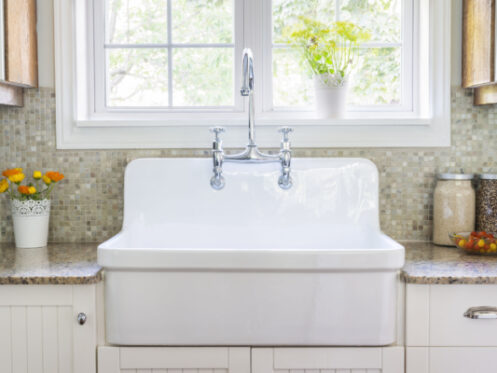A garbage disposal adds some convenience to a kitchen. A properly working disposal unit helps homeowners and apartment dwellers eliminate small amounts of food waste. The spinning blades inside the garbage disposal will shred certain food items, allowing them to wash down the drain into the plumbing system. The process should work without any issues unless there’s a mechanical issue with the system or a clog. The average homeowner might not know how to repair a broken garbage disposal, but they should learn a few tips about keeping the disposal clear and clean. Otherwise, they may contribute to maintenance issues that make repairs or replacements unavoidable.
Cleaning a Garbage Disposal
Most people know that clogged garbage disposal requires attention, but they may need to be made aware that the unit typically requires routine cleaning. Since people can’t see the blades clearly from the drain, they might not realize how “past due” a thorough cleaning is. Still, they may get an indication from foul smells from the drain.
Odors from the drain aren’t the only indicators that a garbage disposal requires cleaning. Food particles might appear in the pooled water when someone runs water in the sink. That would suggest the unit needs cleaning and suffers from a partial clog. If water doesn’t empty through the drain quickly, that could be another sign of a partial clog. Does the system make strange sounds when turned on? That could indicate the system requires cleaning or another problem might exist.
Keeping a garbage disposal clean has numerous upsides. Cleaning reflects essential maintenance that could prevent a worse mechanical problem. Also, there are health considerations associated with cleaning a garbage disposal. Allowing food to remain inside the unit could result in bacteria growth, making people sick. The bacteria present in a garbage disposal may include salmonella, which is notoriously harmful. Fungus might even grow inside a garbage disposal when the owner neglects to clean it.
Garbage Disposal Cleanings: When and How
Common recommendations suggest cleaning a garbage disposal at least once every month. That said, cleaning the disposal unit more frequently, such as once a week, may have upsides. Why allow the unit to collect food refuse for 30 days when it takes little effort to clean the unit? Cleaning the unit ahead of schedule also makes sense when using it more often or a problem seems noticeable.
Running water from the sink alone won’t deliver desirable results. Putting a cleaning solution down the drain becomes necessary. Numerous garbage disposal cleaning products are on the market, and homeowners could purchase one at a supermarket or home improvement store. Some cleaning agents might come with scents that mask any odors that remain after the cleaning commences. Be sure to follow the instructions on the packaging and follow any of the listed safety tips.
One homemade cleaning solution involves mixing baking soda, vinegar, and water. This mix may appeal to those not wishing to use store-bought cleaning products but still want to kill bacteria. In addition to pouring this solution into the drain, it may be helpful to put ice cubes and rock salt down the drain, too. Running the garbage disposal to grind up rock salt and ice cubes might clean off anything stuck to the blades.
For those in the Garland area who feel now is the time to replace their garbage disposal, On Time Experts can help. Our team handles garbage disposal installations and other plumbing jobs.
Preventing Clogs
Clearing away a clogged garbage disposal requires some necessary effort. After all, you can’t use the unit if a clog keeps it from working. Water won’t drain down the sink if the clog is severe enough. However, it may be best to prevent a clog from happening rather than dealing with a stubborn one.
Putting too much refuse into the garbage disposal at one time increases the chances of a clog. Putting a small amount down the drain and using the garbage disposal and running water to clear it before putting more food into the drain might take longer, but this approach could result in fewer clogs.
One cup of food refuse may be a safe amount to put into the unit. After the garbage disposal grinds up the cup of refuse, running water for 15 to 30 seconds can help send the discarded food well into the plumbing system. Rushing too soon to add another cup may cause problems.
Some items should never go down the drain. Grease, eggshells, and coffee grinds may cause significant problems. Plus, egg particles and grease could attract pests. Garbage disposals won’t break apart sizable bones, so they shouldn’t go into the drain, either. Starchy foods and vegetables may seem like things the unit can handle, but they’re inappropriate. Bread, macaroni, and potatoes might turn into a paste-like substance that causes problems with the motor.
Unclogging the Garbage Disposal
Minor clogs aren’t too challenging to fix. However, there are some safety concerns. Namely, putting one’s hand down a garbage disposal unit is dangerous, and using pliers to remove objects stuck in the drain is inadvisable. Using harsh chemical drain cleaners to deal with clogs could be both ineffective and potentially harmful. The substances may give off toxic fumes, and there’s the risk of getting splashed with the corrosive liquids upon turning on the unit.
The previously mentioned white vinegar and baking soda mix could break apart clogged refuse. Pouring dish soap into the drain might have such an effect, too. However, some clogs could prove so stubborn that it may be best to call a plumber.
Contacting a Plumber
A plumber will have the appropriate tools to deal with a severe clog. Perhaps the clog is deep in the drain. A plumber could use a snake to clear out the clog, allowing water and refuse to travel on its way.
A plumber might then examine the garbage disposal for any problems, such as when the garbage disposal is leaking. The leak could result from the seals inside the garbage disposal breaking down because of age. Since the seals are inside the garbage disposal, replacing them becomes impossible. Replacing the entire unit may be the only option.
Even with the best care and limited use, a garbage disposal requires replacing eventually. Ten years is roughly the average lifespan for many garbage disposals. When the unit reaches that age, it may be wise to start planning on upgrading to a new one. Buying and installing a new unit without delays is advisable if the old one dies unexpectedly and prematurely. Installing a new garbage disposal may be best left to professionals rather than a do-it-yourself job.
If you want a new garbage disposal installed, On Time Experts can help. Our company handles a range of plumbing jobs, including drain cleaning and plumbing repairs. We also perform heating and cooling-related services. Our company has an A+ rating from the Better Business Bureau and employs NATE-certified technicians. Contact our Garland office today to learn more or schedule an appointment.

